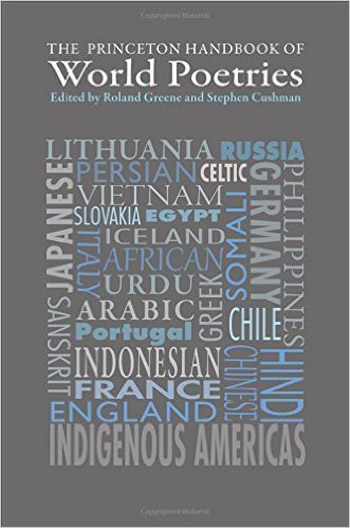|
THE PRINCETON HANDBOOK OF WORLD POETRIES ISBN 978-0-691-17051-0 Eds Roland Greene and Stephen Cushman £24.95 reviewed by Alan Dent
Anthologies, dictionaries and handbooks are a delight and a treasure for the literary. Greene and Cushman have assembled an impressive array of scholars to out together this excellent resource. It is the kind of book to be recommended to any literary neophyte: read its six hundred pages and the shape of world literature ( written and oral) over two thousand years together with the names of the major practitioners, genres and schools is in your head. Of course, this is essentially a reference book. To read it from cover to cover without breaking off to absorb any of the literature it records would be a task. More than a hundred literatures are covered. It goes without saying that not everyone will agree with what has been chosen for reference; but that is a bagatelle. This is not a critical evaluation but a survey. Under the English entry, for example, Lavinia Greenlaw merits a mention but not, for example, Adrian Mitchell. It would be easy to make a case for his inclusion and her exclusion, and it could be argued that choices like this can distort the view. Yet anyone inspired by the book to read their way through twentieth century English poetry would discover those poets whose names have made the list. The great virtue and value of a book of this kind it that many expert minds are brought together in its writing. It provides, therefore, a perspective no single expert could come near. By and large, we are used to reading works by individuals. Itís pleasant to experience the limitations of that being broken. This volume is derived from the more comprehensive Princeton Encyclopedia of Poetry and Poetics. Greene and Cushman, both eminent in their fields, should be congratulated for the precis. It should be said too that the style of the entries is straightforward and easily comprehensible by any willing, literate adult. Books like this arenít glamorous but they are an indispensable contribution, not just to scholarship by to the education of all. Itís a confusion of realms to speak of literary democracy: literature has to be judged by its own values; all the same, this book is a great democratic contribution. The American people should be proud of Greene and Cushman and this book should be in every major library in the world.
THE PRINCETON HANDBOOK OF POETIC TERMS Eds Roland Greene and Stephen Cushman ISBN 978-0-691-17199-9 £74.95/£24.95
Open this book at almost any entry and even if you are conversant with poetic terms you are likely to find you knew less than you thought. It may not be at every poet or criticís fingertips, for example, that a rhyme such as stonework/own work is known as mosaic. In the same way, terms such as polysyndeton, polyptoton, isocolon, homoeoteleuton, anadiplosis may not come readily to many poets. There is an argument that being au fait with such somewhat arcane tropes doesnít assist good writing and can make literary folk mere clever dicks; but perhaps the old saw applies that before you can break the rules you need to know them. Like the volume reviewed above this is a fascinating work for anyone of a literary inclination. Simply to pick out terms you may not be familiar with and mug up on them is a delight. It serves a more serious purpose, of course, then beguiling a few happy hours on the sofa on a Sunday afternoon. It is a fine and high-minded contribution to scholarship. Not only undergraduates writing their essays on Anne Bradstreet or Kathrine Philips, but critics and poets themselves will make use of this handbook in order to enhance their practice. There is a long entry by M.W.Ferguson on poetic syntax which asks fundamental questions about how the words that become poems are assembled and in so doing raises the issue of what we mean by the term poetry. In its final paragraph it refers to Chomskyís famous illustration of the disjunction between syntax and semantics and the reworkings of his sentence by Yuen Ren Chao and others to undermine his contention that his sentence is ďunacceptableĒ. Chomsky is right, of course. As we now know, syntax and semantics are principally under the influence of different brain areas. Damage to one area results in grammatically correct nonsense, to another grammatically impoverished sense. This entry, like others, is much more than a mere reference or reminder: it raises questions we canít answer about what poetry is. These two books combined provide an invaluable resource for anyone interested in poetry, from the casual reader to the day-by-day practitioner. They are timely in a world where it is claimed we are losing our hold on reality and can no longer rely on empiricism or reason. They remind us how important are study, knowledge, and impersonal values.
|

